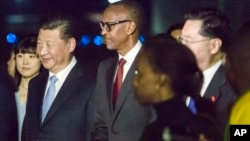On Dec. 8, representatives from 162 countries met in Doha, Qatar, to discuss ideas ranging from global diplomacy to future-shaping innovations.
Rwandan President Paul Kagame addressed the forum, praising China and criticizing the West.
From the West, "we get more in terms of lectures and not so much in terms of value," he said.
With China, on the other hand, Africa has "many decades" of support, including during the processes of decolonization and gaining independence, Kagame said.
"Now the cooperation [with China] presents more value in terms of trade, investment. This relationship doesn't come with a lot of strings attached like we have had with many other parts of the world."
That is false.
There is ample evidence that China uses ''debt trap diplomacy'' to exploit Africa's natural resources, dominate infrastructure projects and acquire locations for its military bases, among other things.
That "diplomacy" has made China the biggest controller of Africa's natural resources.
According to experts, Beijing traps poor African countries by lending them unmanageable sums of money while taking collateral in the form of natural resources. In a default, a state is forced to relinquish some of its strategic assets to reduce the debt.
On Aug. 15, Reuters reported that the "Nigerian government accused a Chinese company of mounting a campaign to seize its assets overseas, including presidential jets,'' after Ogun, a Nigerian state, terminated a contract to develop a free-trade zone in 2015.
"Presidential spokesperson Bayo Onanuga said Zhongshan Fucheng Industrial Investment Co. Ltd. is using 'unorthodox means' to target Nigerian government property, despite having no contractual obligations with the federal government," Reuters reported.
A day later, the Chinese company said in a statement that "it had lifted the seizure of the Nigerian presidential Airbus A330" and instead would explore legal process.
In 2018, it was reported that China had bugged and spied on the African Union, which represents all 54 African countries, for five years after funding the construction of its headquarters with $200 million.
Last year, research by the Institute for Security Studies, ISS, exposed "concerns about a lack of transparency, clauses impacting local industries, and the absence of collective restructuring options in Chinese loan contracts."
An investigation by AidData, a U.S.-based aid transparency outlet that provides access to development finance records, found that since 2014, "China's contracts have become more secretive over time, with a confidentiality clause in every contract" containing restrictions that hide loans from the people who are bound to repay them via taxes.
"China's contracts also give it broad latitude to cancel loans or accelerate repayment if it disagrees with a borrower's policies,'' AidData revealed.
Kagame failed to mention that Beijing lends money to poor African countries for huge infrastructure projects such as the China Belt and Road Initiative and sends its own companies to work on them, thus denying the local population job opportunities.
In countries such as Kenya, where the Kenya China Economic and Trade Association reported on Dec. 18 that Chinese companies employed there more than 60,000 Kenyans between 2022 and 2023, a past investigation by a local newspaper, The Standard, showed that employees experienced "neo-colonialism, racism, blatant discrimination" and human rights abuses.
In Nigeria and Ghana, the locals who do get employed by Chinese companies complained of human rights abuses and poor working conditions.
As for Kagame's claim that Africa gets "more in terms of lectures and not so much in terms of value" from the West, the facts are that the United States is the single largest donor to Rwanda and other African countries.
According to USAID, the U.S. has "helped support the agriculture-led poverty reduction the country has seen over the past 15 years — from around 60% to around 40%."
On Sept. 5, Kagame attended a forum in Beijing where African countries sought quicker financial solutions to the growing debt problem. There, he met with Chinese President Xi Jinping, who pledged to invest nearly $51 billion and create 1 million new jobs across Africa in the next three years. Yet Xi failed to provide debt relief to the African countries already burdened by Chinese loans.
In Sierra Leone, a West African country, parliamentarians exposed bribery allegations against China Kingho, a company that corrupt government officials awarded four mining licenses despite declaring bankruptcy back home.
Last year, a joint investigation by the Telegraph and SourceMaterial exposed how corrupt Chinese investors — working with "corrupt government officials” — are “plundering the natural resources of Sierra Leone and harming people's health and causing serious environmental damage in the process."





